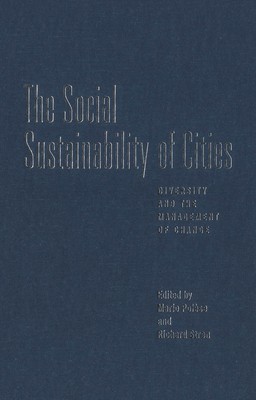
- We will send in 10–14 business days.
- Publisher: University of Toronto Press
- Pages: 334
- ISBN-10: 080208320X
- ISBN-13: 9780802083203
- Format: 15.3 x 22.9 x 2.6 cm, softcover
- Language: English
- SAVE -10% with code: EXTRA
Social Sustainability of Citie (e-book) (used book) | bookbook.eu
Reviews
Description
Cities are a locus of human diversity, where people with varying degrees of wealth and status share an association within a particular urban boundary. Despite the common geography, sharp social divisions characterize many cities. High levels of urban violence bear witness to the difficult challenge of creating socially cohesive and inclusive cities. The devastated inner cities of many large American urban centres exemplify the failure of urban development. With an enlightened democratic approach to policy reform, however, cities can achieve social sustainability.
Some cities have been more successful than others in creating environments conducive to the cohabitation of a diverse population. In this collection of original essays, case studies of ten cities (Montreal and Toronto in Canada, Miami and Baltimore in the United States, Geneva and Rotterdam in Europe, Sao Paulo and San Salvador in South America, and Nairobi and Cape Town in South Africa) are presented and analysed in terms of social sustainability. The volume as a whole looks at the policies, institutions, and planning and social processes that can have the effect of integrating diverse groups and cultural practices in a just and equitable fashion.
The authors conclude that policies conducive to social sustainability should, among other things, seek to promote fiscal equalization, weave communities within the metropolis into a cohesive whole, and ideally, provide transport systems that ensure equal access to public services and workplaces, all within the framework of an open and democratic local governance structure.
EXTRA 10 % discount with code: EXTRA
The promotion ends in 16d.18:35:31
The discount code is valid when purchasing from 10 €. Discounts do not stack.
- Publisher: University of Toronto Press
- Pages: 334
- ISBN-10: 080208320X
- ISBN-13: 9780802083203
- Format: 15.3 x 22.9 x 2.6 cm, softcover
- Language: English English
Cities are a locus of human diversity, where people with varying degrees of wealth and status share an association within a particular urban boundary. Despite the common geography, sharp social divisions characterize many cities. High levels of urban violence bear witness to the difficult challenge of creating socially cohesive and inclusive cities. The devastated inner cities of many large American urban centres exemplify the failure of urban development. With an enlightened democratic approach to policy reform, however, cities can achieve social sustainability.
Some cities have been more successful than others in creating environments conducive to the cohabitation of a diverse population. In this collection of original essays, case studies of ten cities (Montreal and Toronto in Canada, Miami and Baltimore in the United States, Geneva and Rotterdam in Europe, Sao Paulo and San Salvador in South America, and Nairobi and Cape Town in South Africa) are presented and analysed in terms of social sustainability. The volume as a whole looks at the policies, institutions, and planning and social processes that can have the effect of integrating diverse groups and cultural practices in a just and equitable fashion.
The authors conclude that policies conducive to social sustainability should, among other things, seek to promote fiscal equalization, weave communities within the metropolis into a cohesive whole, and ideally, provide transport systems that ensure equal access to public services and workplaces, all within the framework of an open and democratic local governance structure.


Reviews